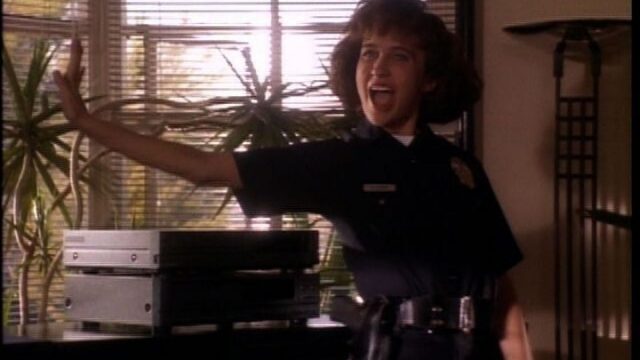I’ve been watching Cop Rock in the mornings lately, before my kids wake up. (Yes, I will eventually be writing essays about every episode, to pair up with drawings from Anthony Pizzo. No, this is not going to be soon; he’s got to finish Six Feet Under first. Yes, I will post them here.) For thirty years now, I have been aware of the existence of this show and have not actually gotten around to watching it. The morning DJs on KROQ, the alternative radio station in Los Angeles, were in theory watching it as it aired, though in practice they’d talk the next morning about exactly how many minutes they’d gotten through before turning it off. And for thirty years, the phrase I’ve heard connected to it is “high concept.”
It’s not that Cop Rock doesn’t have a plot; Cop Rock has a lot of plot. More plot than it knows what to do with. Especially since I don’t think it takes enough time to make sure you know characters’ names. But it is a combination of a gritty cop show and a musical, and that’s definitely something where your elevator pitch is not the story, it’s the concept. Hill Street Blues—explicitly referenced in several places, including an entire musical number called “Let’s Be Careful Out There”—crossed with, well, a musical. Following musical tropes a lot of the time, if not confined to a particular style of music.
I think it’s harder for shows like that to succeed, in part because the genres do not always blend well. (Though that’s not really the problem I have with Cop Rock.) Most movies and TV shows, you start with “it’s a comedy” or “it’s a drama” or even “it’s a dramedy,” and that gives people a place to land. With “high concept,” you have to explain your concept before you can explain your plot, I think, or anyway you’ve got to explain it at some point. You can’t explain what you’re really doing until you explain how you’re going to do it.
“High concept” doesn’t always just mean genre-mashing, but it does mean “this is going to require additional explanation.” I think we’ve spent so long with everything the way we expect it to be—centuries at least—that it’s a little hard for us to deal with “and now we’re doing something different.” I’d imagine the original musicals were confusing in that way. Not because people stopped talking and started singing but because they did both. Opera is just singing, and people accepted that to a certain extent, but the ida that you’d cross a play and an opera was weird. And that’s even though there are songs in Shakespeare; that’s usually people listening to someone else perform for them.
The funny thing, of course, is that the industry uses “high concept” in a slightly different way. In the industry, “high concept” means that it’s something where the explanation is shorter—because all you have to do is explain your concept. You don’t have to explain your story. Quantum Leap is considered high concept, because it’s simply “what if a guy got trapped living other people’s lives?” Toy Story is high concept, because it’s simply “what if toys lead secret lives when no one’s looking?”
But of course you then still have to explain more about them. Because beyond the concept, you have “Sam was a brilliant scientist whose time-travel theory was mostly accurate but now he’s in the past leading other people’s lives for a few days with the help of his best friend who he only interacts with as a hologram, and also Sam doesn’t remember vast amounts of things.” You have “there’s a rivalry between the Old Favourite and the New Exciting One, and figuring out who does what delves into the realities of the human heart.” And, yes, I could here explain the plot of Cop Rock, because just having the cops start singing isn’t enough to fill a single one-hour episode all by itself, much less a full series.
I think high concept is easier to pitch but harder to sell, if you get what I mean. The elevator pitch is easy, because it’s just the concept. Which is usually just a “what if?” sentence. What if theme park of dinosaurs? What if boy turns into dog? What if showgirl hides with nuns? What if cop and criminal swap faces? What if alien lives with suburban family? There’s your pitches, and I’m pretty sure most people can figure out what some or all of those are, because by Hollywood standards, some of the biggest blockbusters going are “high concept.”
I think we’re inclined to use “high concept” wrong because of the “high” part. There is probably a smarter way to phrase it so that it’s not so confusing. But I think it’s also that so many weird shows and movies fall under the “high concept” term because their weirdness stems from their what-if. “What if cops but singing” is always going to be weird.
Keep me in weird shows to share; consider supporting my Patreon or Ko-fi!

